
The Maine gubernatorial election of 2006 took place on November 7, 2006. Incumbent Democrat John Baldacci was re-elected to his second term. This was the last time a Democrat won statewide office in Maine until 2018, when Janet Mills won the gubernatorial election over Republican Shawn Moody.

The 2010 Maine gubernatorial election took place on November 2, 2010. Incumbent Democratic Governor John Baldacci was term-limited and unable to seek re-election. Primary elections took place on June 8, 2010. The candidates who appeared on the November ballot were : Eliot Cutler (Independent), Paul LePage (Republican), Libby Mitchell (Democrat), Shawn Moody (Independent), and Kevin Scott (Independent).

The 1998 Maine gubernatorial election took place on November 3, 1998. Independent Governor Angus King sought a second and final term as governor. King faced off against former United States Congressman James B. Longley, Jr., the Republican nominee; attorney Thomas J. Connolly, the Democratic nominee; and several other independent candidates, including Green candidate Pat LaMarche, who would later serve as the Green Party's Vice Presidential nominee in the 2004 presidential election.

The 1986 Maine gubernatorial election took place on November 4, 1986. Incumbent Democratic Governor Joseph Brennan was term limited and unable to seek re-election. First district Congressman John McKernan defeated Democratic Party challenger James Tierney as well as former Republican turned Independent Sherry Huber and former Portland, Maine city manager John Menario, making McKernan the first Republican to win The Blaine House since 1968.

The 1982 Maine gubernatorial election took place on November 2, 1982. Incumbent Democratic Governor Joseph Brennan defeated Republican challenger Charles R. Cragin. Brennan defeated Cragin, winning his re-election by the largest number of votes in the state's history, and the highest percent margin in more than thirty years. The 281,066 votes received by Brennan represented the single highest vote total for governor in Maine history, until the re-election of Governor Paul LePage in 2014.

The 1970 Maine gubernatorial election took place on November 3, 1970. Incumbent Democratic Governor of Maine Kenneth M. Curtis chose to seek re-election. Curtis won a landslide victory in the Democratic primary. His general election opponent was Maine Attorney General James Erwin, the Republican nominee. Erwin had also easily won his respective party primary and received the Republican nomination for governor. Curtis narrowly defeated challenger in one of the tightest elections in Maine history – the final margin of victory was a mere 890 votes. Curtis received 163,138 votes (50.14%), while Erwin had 162,248 votes (49.86%).
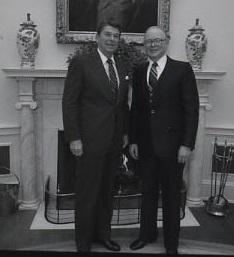
The 1966 Maine gubernatorial election took place on November 1, 1966. Incumbent Republican Governor John Reed, had been elected to finish the term of Clinton Clauson in 1960, was then re-elected in 1962 and became the state's first four-year Governor. Reed was seeking a second full four-year term, and was challenged by Democrat Kenneth M. Curtis. Curtis defeated Reed, beginning a twenty-year period of Republican isolation from the Blaine House.

The 1962 Maine gubernatorial election took place on November 6, 1962. Incumbent Republican Governor John Reed, had been elected in 1960 in a special election to finish the final two years of Clinton Clauson's term following his death, and was seeking a full term of his own. He faced off against Democratic challenger Maynard C. Dolloff. Reed was re-elected by one of the narrowest margins in Maine history – a mere 483 votes.
As of 2018, this is the last Maine gubernatorial election in which the Republican candidate won over 50% of the vote.

The 1960 Maine gubernatorial special election was a special election held to officially elect a governor following the death of Governor Clinton Clauson. It took place on November 8, 1960 with Republican Governor John Reed defeating Democrat Frank M. Coffin.
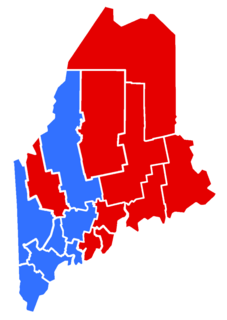
The 1958 Maine gubernatorial election took place on September 8, 1958. Incumbent Democratic Governor Edmund Muskie, was term limited and seeking election to the United States Senate, thus did not run. Democrat Clinton Clauson, then mayor of Waterville, unexpectedly defeated Muskie's chosen Democratic candidate in the primary, and faced off against the popular previous two term Republican Governor, Horace Hildreth in the general election. Hildreth was the heavy favorite to win, however Clauson was able to narrowly defeat him, retaining the Blaine House for the Democrats.
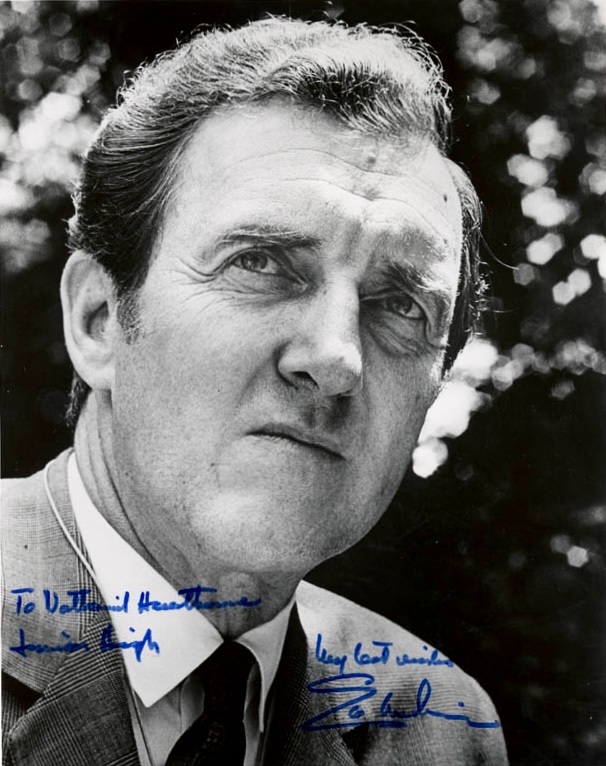
The 1956 Maine gubernatorial election took place on September 10, 1956. Incumbent Democratic Governor Edmund Muskie was seeking re-election, and faced off against Republican Willis A. Trafton, Jr. in the general election. Extremely popular, Muskie was able to easily win re-election.

The 1954 Maine gubernatorial election took place on September 13, 1954. Incumbent Republican Governor Burton M. Cross was seeking a second term which would have made him the fifth consecutive Governor to be elected twice. Democratic state representative Edmund Muskie, widely viewed as the underdog due to Maine's solidly Republican history, was able to pull an upset victory and become the first Democrat to be elected to the Blaine House since Louis J. Brann in 1934, and only the fourth Democrat in the 20th century. His election is widely viewed as the first step in making Maine a two-party state.

The 1952 Maine gubernatorial election took place on September 8, 1952. Incumbent Republican Governor Frederick G. Payne was term limited and seeking election to the United States Senate, thus did not run. Maine Senate President Burton M. Cross faced off against Democratic challenger, former Congressman James C. Oliver and Independent Neil Bishop in the general election, easily defeating both men. Burton's election was the ninth consecutive victory for the Republicans in Maine gubernatorial races.
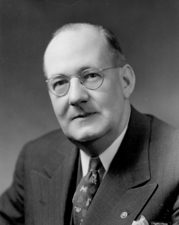
The 1950 Maine gubernatorial election took place on September 11, 1950. Incumbent Republican Governor Frederick G. Payne was seeking a second term, and faced off against Democratic challenger Earle S. Grant. Payne went on to win re-election by a wide margin.
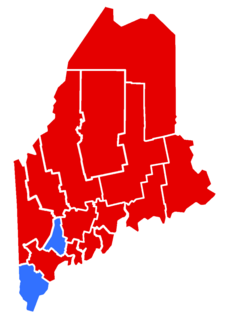
The 1948 Maine gubernatorial election took place on September 13, 1948. Incumbent Republican Governor Horace A. Hildreth, was term limited and seeking election to the United States Senate, thus did not run. Republican mayor of Augusta Frederick G. Payne faced off against Democratic challenger Louis B. Lausier, defeating him in a landslide.

The 1946 Maine gubernatorial election took place on September 9, 1946. Incumbent Republican Governor Horace Hildreth, was seeking a second term, and faced off against Democrat F. Davis Clark. This election represented the first gubernatorial election in Maine following the end of the Second World War, and saw Hildreth easily win re-election

The 1944 Maine gubernatorial election took place on September 11, 1944. Incumbent Republican Governor Sumner Sewall, was term limited and could not seek re-election. Republican Maine Senate President Horace Hildreth faced off against Democrat Paul J. Jullien, and defeated him in one of the most lopsided elections in Maine history.
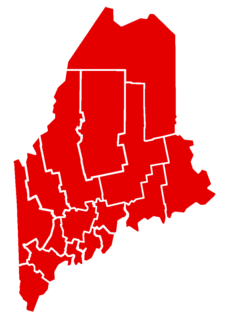
The 1942 Maine gubernatorial election took place on September 14, 1942. Incumbent Republican Governor Sumner Sewall was seeking a second term, and faced off against Democratic challenger George W. Lane, Jr. Sewall was able to easily win his re-election. This contest was the first gubernatorial election held after the entry of the United States into the second world war.

The Connecticut gubernatorial election of 1990 included a three-way race for a seat left open when Governor Bill O'Neill declined to run for re-election. A Connecticut Party nominee Lowell Weicker won the election, becoming the first third party candidate to win a gubernatorial election since the 1970s in Maine.
Michael D. Thibodeau is an American politician and businessman from Maine. He was a Republican State Senator from Maine's 23rd District, representing all of Waldo County. He graduated from Hampden Academy in 1984. He was first elected to the Maine State Senate in 2010 after serving from 2006 to 2010 as state representative. He also served on the Board of Selectman of Winterport.



















